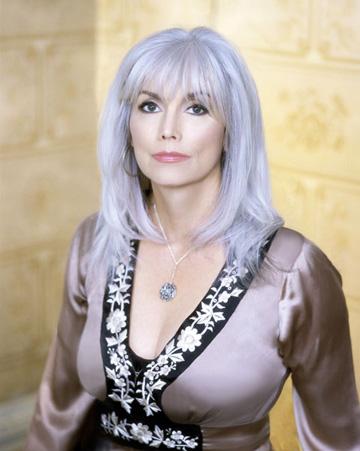Emmylou Harris: All She Intended to Be
By • November 6, 2012 0 5943

Well, we’ll be doing the songs I’ve done over the years, from the beginning until now. We’ll mix it up a little, but they’ll be songs people know, “ Emmylou Harris said in a phone interview about her upcoming August 15 concert at Wolf Trap in a matched set with singer-song writer John Prine, another enduring voice.
The songs—could be the matchless “Boulder to Birmingham,” “To Know Him Is to Love Him” or songs from her last and perhaps most intimate album, “Hard Bargains,” for which Harris wrote almost all of the songs. Could be something like “Pancho and Lefty” or the achingly familiar “One of These Days.” Lots to choose from in a 40-year-career.
Her voice over the phone is matter-of-fact elusive, due to a weak connection, but the accumulated stuff is pretty clear—it’s hard to imagine Emmylou Harris being anything else than the singer she is, or at least that’s the way she sees it. “I’m not sure I could have done anything else,” she says. “This is what I do, who I am. It’s complicated, sometimes, but I’ve been doing this all my life and will be doing it all my life.”
When you hear her sing—in a concert at venues as different as the Music Center at Strathmore or Wolf Trap— the presence and voice is clear as undiluted spring water, flowing. You can hear her life in the songs, the changes, the losses, the adding on of different kinds of music so that whatever she does, there’s always surprises, or things that have never gone away.
“I try to keep things simple when I write,” she says, and it sounds both true and a little too modest. Singing her own songs, or that of others, you hear the spirit of something grainy, pure dirt and wood American, a little cowboy, a lot of unrefined, raw country, the purity of folk with touches of rock and rockabilly, bluegrass and—when she’s of a mind—corner-piano, Broadway, break-your-heart brassy ballads. You can catch the looks, changing, over the years from her album covers, the pitch-black long hair, now turned white, the cheekbones. Now at 65, thrice-married with grandchildren, she looks as magnetic as ever. She looks like a good witch, in some ways. The voice is a little changed, according to her.
“Well, I don’t think I can quite hold the high as long as I used to,” she says. “You lose some things, gain some things. It’s what it is. You adjust, you find new ways, new music, and sometimes you can be more direct.” It’s something you could honestly disagree with her about—life has added some rich, tremulous and heart-probing stuff to her voice, upon listening.
“You know, you always reflect, think of who you were and what’s happened, it informs what you do,” she says. “I can look back when I started out, I was a product of the ‘60s, you know, folk singers and rock, and that stuff. You’d hear country music and sort of treat it with contempt. We didn’t get it, you know.”
With her parents living in the Washington suburbs, Harris famously sang at the Childe Harold in Dupont Circle, now defunct and re-arranged into a different place. “It was a different time,” she said. “I lived a few blocks from the place.”
Her attitude, and quite a few other things, changed when she met Gram Parsons in D.C. He was the legendary and charismatic leader of the Flying Burrito Brothers who was starting a solo act and looking for a girl singer, and that would be Emmylou Harris. The Parsons-Harris relationship is the stuff of musical legend in some ways—people talk about not in the rumor sort of way, but in the sense that Parsons—as close friend, mentor and inspiration helped her emerge with all her gifts firing. “He had a huge impact on me, he inspired me, he educated me about country music, its roots and what it could be, in its basic unadorned ways.”
Parsons died of an accidental drug overdose in 1973, and the shock of that, the hole in her heart, you suspect, is still there. “Sure, he’s with me, he changed my life, and it was a hard, hard loss,” Harris says. He’s in the early “Boulder to Birmingham” and in the song she wrote for “Hard Bargains,” “The Road” as in : “I can still remember every song you played/long ago when we were younger and we rocked the night away.”
“Hard Bargains” also features a song called “Big Black Dog,” which is an outcrop of another passion of hers: the love of dogs, rescuing dogs, being with dogs. Harris runs Bonaparte’s Retreat, a non-profit rescue operation which she runs out of her home Nashville. The “Big Black Dog” in question and music is one Bella, a mix “of just about every breed you can a think of,” who travels with her when she tours in her bus.”
“I can’t believe I never did that before,” she says about traveling with a dog. “It is, I don’t know, such a gift, the companionship of a dog. It’s soothing, full of love.”
She seems to have a gift for easy and long friendships, a natural affinity for musical collaboration. Look her up, and you’ll find almost everybody that’s ever picked up a guitar and banjo, pounded on drums or sung songs for a living in Nashville listed in the “worked with” category.
Harris—while her life has surely been dramatic—isn’t the type of person that get’s talked or whispered, or yacked about a lot about as a star, or god-forgive-them, super-star. She’s the kind of singer-songwriter-performer you remember just a little after the last note is gone as well as years later.
John Prine and Emmylou Harris, Aug. 15, Wolf Trap, Filene Center, Vienna, Va. — www.WolfTrap.org.

